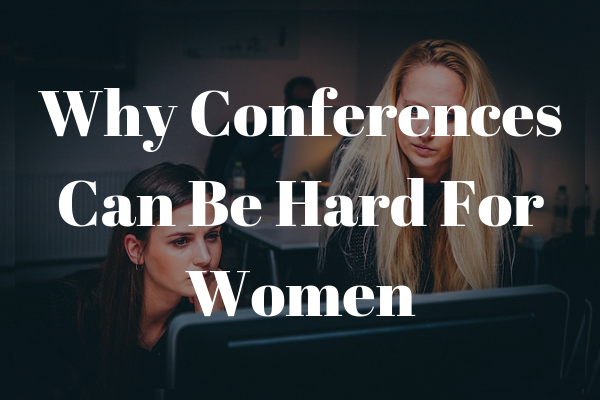
Academic Conferences Can Be Difficult For Women. Here's Why
Read a summary using the INOMICS AI tool
Conferences are a key part of academic life, but they can be difficult events for women to thrive in. Much like in other spheres of life, women experience harassment, danger, and judgment. Conferences need to do more to help women at conferences feel safe, secure, and free to talk, share their ideas, and grow. Read on to learn more about the problems women face at conferences at what conference organisers can do to help.

The problem of sexual harassment
Sexual harassment is an issue that women in all areas of work have to deal with. Conferences can be particularly bad for harassment of women as they encourage mingling and socialising between the participants, which some men take as an invitation to be inappropriate with their female colleagues.
Another issue is that conferences often involve alcohol at social events and gatherings, which can lead to more inappropriate behaviour on the part of men. There are many horror stories of women being harassed at conferences, especially by older or more senior colleagues who women may not feel able to speak up against.
Solutions to sexual harassment at conferences
Conferences should have anti-harassment policies in place and make sure that everyone is aware of these policies to try to lessen incidents of harassment.
Unsafe conference venues
Before you travel to a conference, you may have little information about the area where the conference is being held or where you are staying. You might arrive to find that either the conference or your hotel is in a rough area of town, which makes getting to and from the conference intimidating, especially for women who are travelling alone.
Women have reported being followed and physically threatened when travelling to academic conference venues at night, leaving them shaken and uncomfortable at their events.
Solutions for conference venue organisers
Organisers of conferences should consider whether their venues are in a safe area of town and whether they would feel comfortable travelling alone there at night.
Getting childcare
As women still do the majority of the childcare in most couples with children, this presents a particular problem for women wanting to travel to conferences. Going to a conference usually involves being away from home from anywhere from a few days to a week or more, which makes getting childcare a considerable issue. Mothers in academia have to worry not only about getting funding for their travel and for the cost of registering for the conference, but also have to budget for a considerable amount of childcare time and find someone trusted to look after the children for that long.
How can conferences help women in need of childcare?
Some conferences do offer family-friendly options like childcare available on site, so parents can travel to the conference with their children and then put them in the on site daycare while they work, but this is still rare. More work needs to be done to support families and working mothers in particular in all areas of academia.
Being judged on their appearance
Women in academia, like other areas of business, face a particularly frustrating double bind when it comes to their appearance: if they dress in a way that is considered too casual, too sloppy, or not feminine enough, then they are considered slovenly and unprofessional and are looked down on. But if they dress in a way that is perceived as too feminine or attractive, then they are considered frivolous and shallow and are not taken seriously.
While male academics can generally wear trousers and a shirt and have no one think twice about their clothing, women are judged on their makeup (or lack thereof), their hairstyle, and their clothes. This judgement is distracting and frustrating when women just want to share their academic research in a professional context.
Being less likely to be given a speaking slot
The prime slots that everyone wants at a conference are the talks, and the keynote speeches in particular. These are the items that look best on a CV and command the most attention at conferences. However, women are less likely than men to get the opportunity to speak at conferences, with studies showing women make up just 27% of invited speakers.
This problem is particularly pronounced when the panel choosing which speakers to invite is made up of men. There is a related issue of race as well: people of colour make up a disproportionately small percentage of speakers at conferences and women of colour especially are noticeably absent from some events.
Strategies for to get more women speaking at conferences
Strategies to mitigate this issue and make speakers more diverse include encouraging attendees and speakers to boycott panels that are all male, and training moderators to be aware of gender and race issues and to seek input from marginalised groups.
Top Blog Posts to Read:
-
- Conferencia
- Posted 1 month ago
THE ITALIAN ECONOMIC ASSOCIATION 66th ANNUAL CONFERENCE
Between 23 Oct and 25 Oct in Naples, Italia
-
- Conferencia
- Posted 2 weeks ago
Next Generation Dx Summit 2025
Between 18 Aug and 20 Aug in Washington, Estados Unidos -
- Conferencia
- Posted 2 weeks ago
Digital Transformation & Innovation in Financial Services Conference
30 Sep in London, Países Bajos











